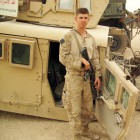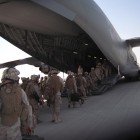By Mario Geary
On May 27, 2009, Mobile Assault Platoon 4 was living in the sands about 10 miles south of Fallujah, Iraq, in support of Operation Polaris. Thirteen Marines and one Navy Corpsman were relaxing and quietly talking in the shade next to four up-armored vehicles. Suddenly, three 105mm rockets screamed overhead and burrowed, unexploded, into the soft sand about 50 meters behind. As I took cover, I remembered a conversation I had had with my mom on the phone two weeks earlier. I had reassured her that I’m probably safer turning 21 in Iraq than in Isla Vista.
In September 2006, I was a resident of Camuesa House in Manzanita Village. I had a view of the ocean, a car, and my parents would pay the bills for one year. However, as so many well-off kids do, I still complained about everything. Ugh, 10am classes are too early. OMG the dining commons are so far away. I rarely went to class because 50 minutes of lecture was just too long. Feeling that my life would just fall into place, a lack of motivation had overrun my body. Grow up, go to and graduate from college, get a job, get married, and die. Despite being given great advantages in life, there was something missing: perspective.
On Memorial Day in 2006, USA Today featured a huge picture on the front page of a Marine being carried out of an Iraqi house, soaked in blood and with a pistol gripped in his hand. It was 1st Sergeant Bradley Kasal (USMC), who received the Navy Cross (the second highest military medal) for heroism while fighting insurgents in Fallujah. He had been shot seven times and hit with over forty grenade fragments while shielding fellow Marines. Now, 1st Sergeant Kasal is just happy to be alive every day. The best perspective one can have on life.
After reading the Kasal story, I went on a quest to get some perspective. I called the Marine Corp recruiting office in Santa Barbara and told them I wanted to be a Marine Infantryman. A few days after school ended in June 07, I was in an entirely new world: the infamous Marine Corp boot camp in San Diego, where boys are turned in killing machines. Thirteen weeks of early wake-ups, short haircuts and constant yelling gave me my first taste of a difficult life. Most kids my age spent the summer at the beach, with little jobs and getting ready for the next year of school. I had become a Marine with orders for war.
Between the time that I had joined the Marines and landed in Iraq, the situation had changed. Iraq had become a somewhat calm combat zone where I could be put up on murder charges for killing the wrong person. The actions of the three men in my vehicle could also land me in prison. It seemed staying out of trouble was more important than killing the enemy. My training taught me to never hesitate, to never think twice, but to react swiftly with concentrated devastation. In boot camp, when you hesitate during an obstacle, or at the door of the gas chamber, as I did, the Drill Instructors scream “Hesitate and PEOPLE DIE!” However, this war game was much more complicated.
Most Marines want a “kill” while they’re deployed in a combat zone. For others, the priority is simply making it home. I just wanted my experience to make IV and college seem easy. And in that respect, it was an astounding success. In Iraq in 2009, there was no more high-intensity combat where bombs were going off everywhere and bullets were flying, but just combating sand storms and 120 degree heat with 70 lbs of bulky gear on makes anything seem easy. After several months of rockets, snipers and IEDs, I was back at Camp Pendleton, CA. My company came home in one piece, and it was as if we never left.
After returning to IV this fall for a couple weeks of drinking and partying, I wanted to go back. War produces unrivaled camaraderie among a platoon of men. Men at war know more about each other than couples who have been married for 50 years. Nobody in the world would go more out of their way to help another in need. There’s something about reality that gets lost in IV. Most people act in an artificial, self-centered way and find that doing something for the benefit of another is preposterous. Typical behavior when you have no perspective on life.













Comments are closed.